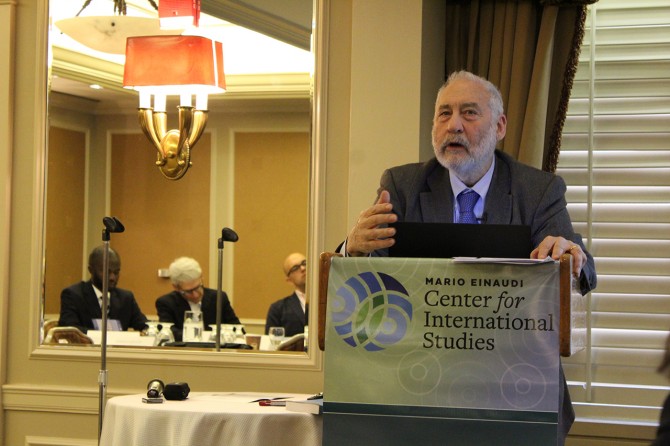Law/economics initiative takes on big questions at kickoff conference
By Jonathan Miller
For most of human history, nearly everyone lived in precarious conditions – their lives, in the words of the 17th-century philosopher Thomas Hobbes, “solitary, poor, nasty, brutish and short.”
Then came the Enlightenment, with its spirit of scientific inquiry and democratic experimentation. Technology flourished, and so did the law. The result, argued economist Joseph Stiglitz on April 12 at the Cornell Club in New York, was a dramatic improvement in per capita income, life expectancy and general human welfare.
President Donald J. Trump, Stiglitz continued, is a “pre-Enlightenment leader” who disdains science and rejects the law. “What he wants us to do is go back to the world before 1750, and that is a world of stagnation.”
Stiglitz, winner of the 2001 Nobel Prize in economics, delivered the keynote address on Contemporary Challenges in Law, Economics and Conflict, the inaugural conference of the Cornell Research Academy of Development, Law and Economics (CRADLE), an interdisciplinary initiative led by professors Kaushik Basu (economics) and Robert Hockett (law) and supported by the Mario Einaudi Center for International Studies.
Trump was not Stiglitz’s only target. He also blamed the Chicago school of economics for providing intellectual cover for policies in many countries that promote the rights of businesses and the politically powerful over collective interests such as equity, education and public health. Those policies, he said, are not just morally problematic; they also weaken economies and undermine democracy.
“The real issue at debate is the underlying structure of our society,” he concluded.
Stiglitz’s presentation was one of many during the two-day meeting that wrestled with fundamental questions about the relationships between law, economics, politics, morality and human welfare, particularly as they relate to the developing world.
Participants included legal scholars, economists and economic development specialists from Africa, Asia, Europe and North America. Topics ranged from specific case studies (the role of laws in shaping attitudes toward caste in India, the economics of the Israel-Palestine conflict) to methodological issues (the limits of game theory in explaining economic behavior, the challenge of measuring public welfare) to basic social theory (the evolution of the law, the nature of cooperation).
Several sessions addressed the hazards of broad generalizations and easy fixes. A presentation by Cheryl Long of Xiamen University, China, acknowledged that corrupt politicians often use anti-corruption laws as weapons against their rivals. In a talk on high-interest loans for low-income borrowers, Vanderbilt University’s Paige Skiba suggested well-intentioned caps on payday loans can hurt consumers more than help them. In a discussion of monopoly, Basu asked whether mandatory profit sharing might be more appropriate than anti-trust laws, in some cases. And in a session on the relation between economics and law as academic disciplines, Hockett noted that law affords content to foundational economic concepts including “capital” and “labor” and even “wealth” and “welfare.”
Each talk generated lively debate, as Basu and Hockett had hoped.
“There might be some substantive disagreement between people, here at our inaugural conference and more generally, but it also might be that we simply haven’t yet worked out a framework to determine whether we all mean the same things when we use terms like ‘democracy’ or ‘corruption’ or ‘economic growth’ or ‘prosperity,’” said Hockett, the Edward Cornell Professor of Law. “So it’s almost a meta-conversation at this point, a conversation about what the terms of the conversation should be. And I think that is ultimately helpful in ensuring that the dialogue will be productive going forward.”
Basu, the Carl Marks Professor of International Studies, who served as chief economist at the World Bank (2012-16), said CRADLE is “an ambitious venture” and it could take time for it to find its intellectual footing. But he hopes the group might come to provide an ethical and conceptual counterweight to the Chicago school.
“We want to bring in fine thinking, but not just on how to have growth and an economy ripping forward,” he said. “We want to look at how the growth is being distributed, how marginalized groups can do better. Those can be the girding morals for what CRADLE does.”
Célestin Monga, vice president and chief economist of the African Development Bank, traveled from Ivory Coast to attend the meeting. “I think the idea of CRADLE is wonderful,” he said. “The importance of studying law and economics together has been recognized for a long time, but it has been too focused on microeconomic issues” such as property rights and torts. “In today’s world, the agenda should include macroeconomic issues and the law, political-economic issues and the law, global governance issues and the law,” he said.
Among the many Cornell participants was Erik Thorbecke, the H.E. Babcock Professor of Economics Emeritus and a leading authority on poverty in the developing world. “The somewhat artificial walls that were set around certain disciplines – economics, sociology, political science, law – are being broken, which I think is good,” he said. “Cornell, because of its structure, is very well suited to this. I think CRADLE is going to be a very successful enterprise.”
Jonathan Miller is associate director for communications at the Einaudi Center.
Media Contact
Get Cornell news delivered right to your inbox.
Subscribe

